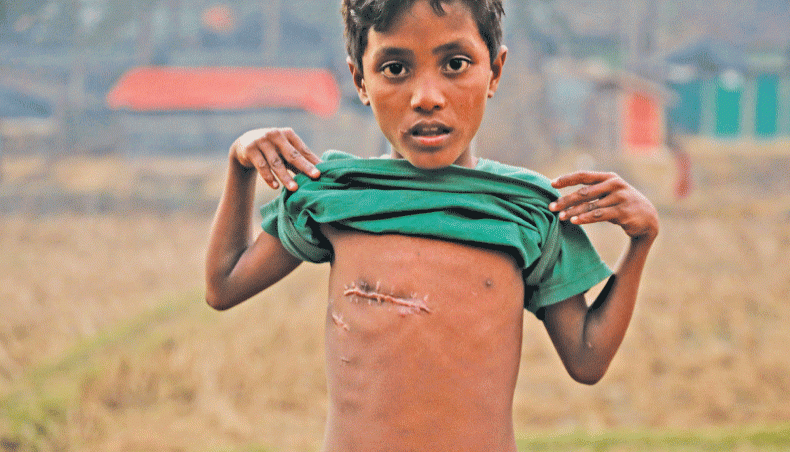Safe water, sanitation still elusive
Rohingyas fleeing violence in Rakhine State continued living in Cox’s Bazar camps amid acute shortage of water, food and sanitation facilities with adults eating less so that children could eat, showed International Organisation for Migration report on Tuesday.
The United Nation migration agency in its Needs and Population Monitoring report said that half or less of the Rohingyas had access to sufficient water to meet their basic needs.
It also said that half or less of the Rohingya population had access to latrines and local forests were the main source of fuel for cooking.
In terms of coping strategies, 71 per cent Rohingyas reported that they were eating less food and 50 per cent reported that adults were eating less so that children could eat.
UN refugee agency UNHCR statement on the day said that a quick refugee assessment by UNHCR and 13 international and local partners in Bangladesh found that Rohingyas’ access to sanitation was still insufficient, leading sometimes to long queues for latrines.
‘Women and girls are anxious about the shortage of private bathing spaces, forcing some to wash outside their shelters in the early morning,’ said the statement.
‘Some refugees said that irregular food distributions and long queues had meant going hungry for days,’ it said.
‘Health services are a wide concern. Increased mental health support for those who have witnessed the killings or suffered torture or rape remains crucially needed. Refugees cite continued feelings of depression and rejection, especially among the elderly and disabled. Many young people are worried about their uncertain future,’ the statement read.
Inter Sector Coordination Group, a combine of all UN agencies and international humanitarian groups operating in Rohingya crisis, in its situation report on Tuesday said that in some of the spontaneously emerged sites, water and sanitation facilities were limited or of poor quality, with extremely high density raising the risks of an outbreak of diseases.
Inter Sector Coordination Group national coordinator Saikat Biswas said that ensuring adequate water, sanitation and health facilities for so many Rohingyas, who entered Bangladesh in a short period, was still a challenge.
He said that they set up shallow tube wells and latrines in the first phase wherever Rohingyas took shelter as they tried to react as soon as possible with humanitarian assistance.
Many of these tube wells became now non-functional, latrines were overflowing and health facilities were haphazard, Shaikat said.
‘But now we are advancing with planning and mapping. We are setting up tube wells, deep tube wells and latrines according to the mapping. Situation is slowly improving,’ he said.
According to the UN estimation till Tuesday, 6,55,000 Rohingyas entered Bangladesh since the beginning of the new influx on August 25.
Officials estimated that the new influx already took to 10.74 lakh the number of documented and undocumented Myanmar nationals in Bangladesh entering the country at times since 1978.
Terrified, half-starved, exhausted Rohingyas continued arriving in Bangladesh in groups trekking through hills and forests and crossing rough sea and the River Naf on boat and taking shelter wherever they could in Cox’s Bazar.
The situation report said that collectively the Inter Sector Coordination Group installed 5,702 tube wells and 4,366 of those were currently functional. For sanitation, 37,215 temporary emergency latrines were built and 29,079 of those were functional.
Overcrowding and congestion in Balukhali camp, also known as Kutupalong expansion, is of major concern and risk, leaving insufficient space for critical WASH and health services, and resulting in outbreaks of communicable disease such as Diphtheria, as well as major protection concerns and increased prevalence of sexual and gender-based violence, said the situation report.
Twenty-one people have died from diphtheria in the Rohingya camps, the World Health Organisation said on Tuesday, adding that it had started a second vaccination drive to rein in the outbreak.
According to the UN health agency, 1,571 suspected cases of the bacterial disease were registered in the Rohingya refugee camps between November 10 and December 17.
‘Twenty-one deaths have been reported among the Rohingya population in Cox’s Bazar,’ WHO spokeswoman Fadela Chaib told reporters in Geneva, adding that about 20 percent of the suspected cases were children under the age of five.
News Courtesy: www.newagebd.net











